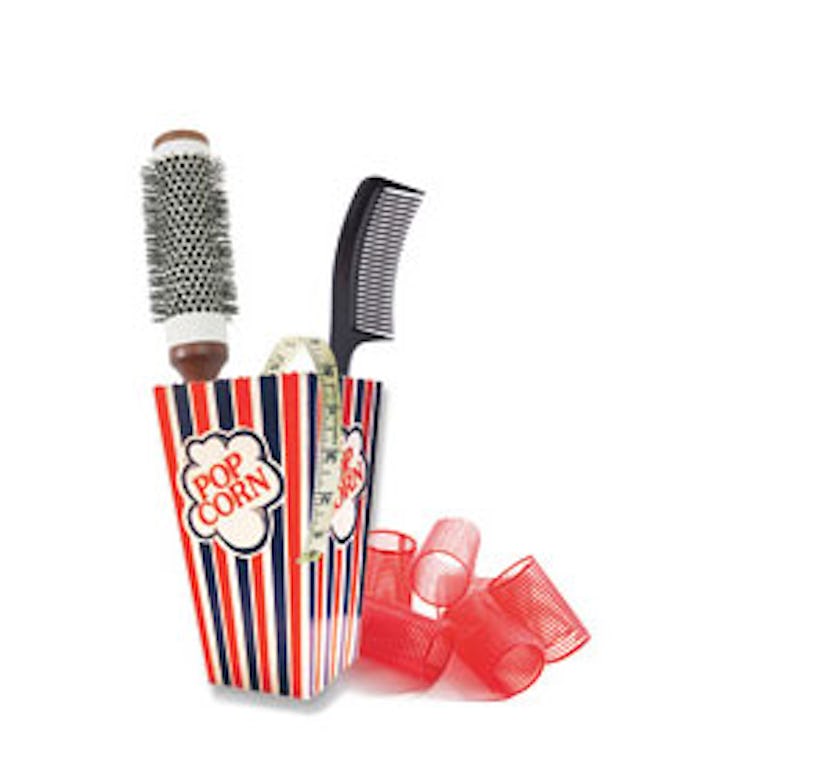Stealing Beauty

“Have you ever had somebody talk you out of something and you didn’t even realize it until, like, a week later?” asks Chris Rock. “That’s what happened every time I brought up this project.” In Rock’s case, the somebodies in question were his manager, his agent and just about everyone else involved in his lucrative career. The project: Good Hair, a documentary about African-Americans’ complex, expensive and at times dysfunctional relationship with their tresses. “Nobody wants to hear that their big client wants to do a documentary about hair,” says Rock. “They want you to do a cop movie, try to stop a drug ring. They’re like, ‘There’s crystal meth out there! We need you to find that meth!’”
Chris Rock observes a child getting her hair chemically relaxed, in his film Good Hair.
It’s true that neither the subject matter nor the format would seem a natural fit for the 44-year-old Rock, but he can now add documentary making to his list of talents. The film, which is enlightening, hilarious and ambitious—Rock even traveled to India to investigate the source of human hair used in weaves—won a Special Jury Prize at the Sundance Film Festival this year and is slated for an October theatrical release.
Rock first got the idea for the movie 15 years ago when he happened to be staying at the same Atlanta hotel as several competitors in the annual Bronner Bros. International Hair Show. “It was so extreme,” says Rock of the event, a sort of Olympics of African-American hairstyling, at which competing coiffeurs display their skills. He began pursuing the idea more seriously two years ago when his elder daughter, then five, expressed jealousy over a friend’s straight locks. “I thought, Already? There’s something to this.”
Rock was able to get a slew of big names to open up about the relationship between hair and self-esteem—everyone from Maya Angelou and Eve to Al Sharpton, who reveals that he adopted his chemically relaxed ’do at the advice of James Brown, of all people. Before a trip to the White House, the Godfather of Soul told Sharpton that the first President Bush would take him more seriously if he had straight hair. “If anyone’s got hair issues…,” Rock says of Sharpton.
Good Hair is one of two new films documenting the lengths people go to in service of beauty. Mitch McCabe’s Youth Knows No Pain, which debuts on HBO in August, focuses on those attempting to inject, implant and nip-tuck their way to eternal youth. And while Rock was intent on remaining an observer—“I’m just a reporter,” he insists—McCabe’s brand of journalism was more participatory. An antiaging-procedure virgin when she began the project (though she does admit to having purchased her first wrinkle concealer at 13), by the end of filming she had undergone an IPL treatment and Radiesse and Restylane injections, all on camera. “I was feeling guilty that I was filming people [getting procedures] and being so voyeuristic,” says McCabe, 38. “It was almost like I had a clothespin on my nose, like ‘Ewww.’ Why shouldn’t I experience what they were feeling?” The filmmaker, who received most of the services gratis from doctors she interviewed, says she has not continued with them, though she doesn’t rule it out for the future and does admit to liking the results, whipping out her iPhone to display a postinjections photo. “You can see a cheekbone!”
In scenes from Youth Knows No Pain, filmmaker Mitch McCabe covers her grays, and McCabe’s late father shows off his breast pillow.
Over the course of two years, McCabe spent time with a 54-year-old California man who had surgery to look like Jack Nicholson; a 53-year-old Texan whose extensive face and body work have left her depressed; and a host of doctors, some of whom couldn’t resist pointing out McCabe’s supposed shortcomings. “You have a little bit of a forward mandible,” says Houston plastic surgeon Franklin Rose, fingering McCabe’s chin. “Some people might object.” McCabe, whose late father was, not coincidentally, a plastic surgeon, says she didn’t take such comments to heart. “I was just like, You’ve got to be kidding me,” she says.
In the end, McCabe insists, she was careful not to take sides on whether the antiaging industry is a boon or a bane for society. “I never like documentaries that say, ‘This is what the filmmaker wants you to think.’” But watching as a twentysomething subjects her lineless face to needle after needle, yelping in pain and leaving a pool of sweat in the doctor’s chair, it’s hard not to wonder whether there isn’t something to be said for aging gracefully.
Photos: Image100/Alamy; Comb: Creativeact–Hygiene series/Alamy; Measuring tape: Tony Lilley/Alamy